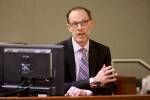An unfathomable level of hubris
Why "are we inviting strangers into the litigation?" asked Clark County District Judge Kathy Hardcastle at a legislative hearing in Carson City on Wednesday.
I don't doubt that it was a rhetorical question, but allow me to venture an answer nonetheless. (As you read the following paragraph, imagine it is being shouted angrily at the top of my well-exercised lungs.)
Because we strangers are the ones who paid for your palatial courthouse! Because we strangers pay your $130,000-plus salaries and for your benefits and for your retirement! Because we strangers sit on your juries and get treated like cattle in the process! Because we strangers are the ones stuck with runaway insurance and medical costs because of your broken tort system! Because we strangers are the ones killed and maimed when product liability lawsuits are sealed by judges like you! That's why, judge!
(You may now reset your volume control to a more temperate level.)
In testifying against Assembly Bill 519, Judge Hardcastle displayed an unfathomable level of hubris while mischaracterizing the role of the courts.
"Courts are the place for people to bring their private disputes to obtain an orderly resolution," she flatly stated. "Citizens should not be required to give up all their rights to privacy."
No, if people have private disputes and do not wish to have them aired in our taxpayer-funded public courts, they can hire a private arbiter.
The judge also complained that, if a judge could not easily seal court records, someone could make false allegations against a teacher and the allegations would haunt the teacher for the remainder of his or her career.
Two can play hypotheses. Equally, a teacher might be rightly accused, only to have the allegations sealed, keeping future employers from ever learning of past misdeeds.
State law declares clearly: "The sitting of every court of justice shall be public except as otherwise provided by law."
But in at least 115 cases in Clark County since the turn of the millennium, judges have seen fit to seal civil cases from public view for no discernible reason. This was revealed by a Review-Journal series earlier this year. The series also revealed a number of the sealed cases involved wealthy and/or influential individuals.
To address this potential for miscarriage of justice comes AB519, sponsored by Assemblyman Bernie Anderson, D-Sparks. It would require a public hearing before any portion of a civil case could be sealed and sets out reasonable conditions for doing so.
The bill may be in trouble.
During that hearing Wednesday, Senate Judiciary Chairman Mark Amodei, R-Carson City, raised the question of whether the bill might run counter to the separation of powers doctrine.
Buy these folks a civics textbook, please. The separation of powers doctrine does not mean that each branch of government is totally independent of the others. Quite the opposite. The doctrine, as embraced by the Founders from the writings of Montesquieu, dictates that each branch must have the power to impose restraints on the others.
When the Legislature runs amok, the courts may tug on the constitutional reins. But the Legislature creates laws the courts must apply.
Yes, the state Supreme Court has formed a commission to review procedures for sealing cases. Hardcastle suggested the Legislature set aside AB519 and let the commission come up with any necessary fixes. But if Hardcastle's disdain for the taxpayers is any indicator, the lawmakers should not put too much faith in the undertakings of judges.
The courts have long held that the public has a First Amendment right to access criminal cases so citizens can engage in informed debate about the conduct of their government.
A few years ago in California, which has a similar law about courts being open to the public, that state's high court concluded public access applies to civil cases, too, and addressed another of Hardcastle's gripes -- that abiding by AB519 might cause delays.
"The need to comply with the requirements of the First Amendment right of access may impose some burdens on trial courts," wrote the justices. "But courts can and should minimize such inconveniences by proposing to close proceedings only in the rarest of circumstances ..."
Just let us strangers in.
Thomas Mitchell is editor of the Review-Journal and writes about the role of the press and access public records and meetings. He may be contacted at 383-0261 or via e-mail at tmitchell@ reviewjournal.com.
THOMAS MITCHELLMORE COLUMNS























